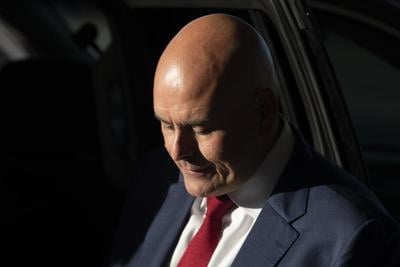Whither Ontario’s Liberals?
Seven months after another humiliating campaign defeat, the party has coughed up a mea culpa of who did what wrong.
Answer: Everything and everyone.
The unanswered question: Who or what can lead the party back to power?
Post-mortems are good for the soul, even if hard to swallow. After the fantasies and failures of the June 2 election campaign, the party’s reckoning with reality leads to an inescapable conclusion:
“We must be realistic and focus on achieving party status so we can build from there,” the review argues (my italics).
Which means that Liberals can’t count on the 2026 election to be the party’s ticket back to power. First, it must go back to being a party again, at least officially — official recognition before vindication.
The Liberals lost their coveted party status when they plunged to seven seats in 2018, falling short of the legislature’s threshold for staff resources and millions in funding that sustain a party in between elections. They missed out for the second time in 2022 by winning only eight seats, still below the cut-off of 12 ridings.
Despite the cash shortage, the Liberals spent $9.6 million in last year’s campaign. But they were easily outspent by the victorious Progressive Conservatives at $11.5 million and the New Democrats at $13 million.
All that said and spent, a shortage of cash wasn’t the party’s sole problem. A lack of ideas, and a shortage of bankable talent at every level — from leader to volunteer — left the Liberals at sea on the campaign trail.
It is painful to read Liberals’ second thoughts about the ex-leader they elected three years ago. They fault an “unpopular” Steven Del Duca for failing to connect with the electorate, as if his shortcomings were impossible for them to foretell when they first chose him in early 2020.
Del Duca quit in the aftermath of last year’s defeat, to which he had seemed oblivious until the end. When I tagged along with him in the campaign’s home-stretch, he quietly asked me how the Liberals were doing — not just curious but clearly clueless about the party’s sagging fortunes.
I’ve never doubted Del Duca’s smarts — he will doubtless serve Vaughan well in his new job as mayor — but I wondered at the time how he and his party could be so disconnected. Apparently I wasn’t alone — the report observes clinically that “the leader was often insulated from the ground realities of the election campaign, including in his own riding … Why didn’t we see this coming?”
The study reminds Liberal supporters that the old “Ontario Liberal Machine” is no more. Equally, the brain trust is in abeyance — the party pointedly skipped a policy convention ahead of the campaign where fresh ideas might be mooted.
Instead, the party platform relied on gimmicks and slogans to attract attention. Aping the tactics of the Tories in 2018, with their notorious “buck-a-beer” pitch, Del Duca’s Liberals proposed an implausible “buck-a-ride” transit program and an incomprehensible “19-point affordability plan” that proved unmemorable.
Little wonder Liberal candidates and volunteers (the latter in desperately short supply) stumbled over the platform’s key points at the doorstep: “We were trying to be too much of everything — and through that, we lost our way.”
The problem for Liberal true believers is that by posing as all things to all people, their campaign wasn’t believable. And yet the party sees itself, and is seen, as “the big red tent” with room for everyone.
It’s undeniable that Del Duca dragged down the Liberal brand in the last election. But it’s often forgotten that the party finished second in the popular vote, rising to a more respectable 23.85 per cent (up more than four points) — edging out the NDP with only 23.74 per cent (down nearly 10 points).
The report’s unstated subtext is that a party dynasty that held power for 15 years at Queen’s Park never laid down deep roots in the province. In truth, the political exile of the Ontario Liberals is common for centrist parties — a similar fate befell their federal counterparts when they fell out of favour and failed to regain their stride.
A party without an ideologically motivated base is prone to cycles of power and punishment, as supporters come and go and come back again. Lacking loyalists, its base disintegrates until it comes together again at the right time — perhaps inspired by the right leader, or merely content with just any leader who can displace an unpopular premier or prime minister.
Opposition parties typically don’t win elections on their own. They count on incumbent governments to lose elections.
That’s how Brian Mulroney beat John Turner, Stephen Harper defeated Paul Martin and Justin Trudeau ousted Harper. It’s also how Doug Ford defeated Kathleen Wynne.
If Liberals face a long and winding road to political rehabilitation and a restoration to power, is there a shortcut? The emerging crop of aspiring Liberal leaders, visible and invisible, will reassure diehard supporters in the coming months that they can remake a moribund movement.
Not so fast. Just as this post-election post-mortem makes depressing reading for longtime supporters, it is a cautionary tale about the prospects for leadership candidates coming late to the party.
Error! Sorry, there was an error processing your request.
There was a problem with the recaptcha. Please try again.
You may unsubscribe at any time. By signing up, you agree to our and . This site is protected by reCAPTCHA and the Google and apply.
Want more of the latest from us? Sign up for more at our newsletter page.



























To join the conversation set a first and last name in your user profile.
Sign in or register for free to join the Conversation